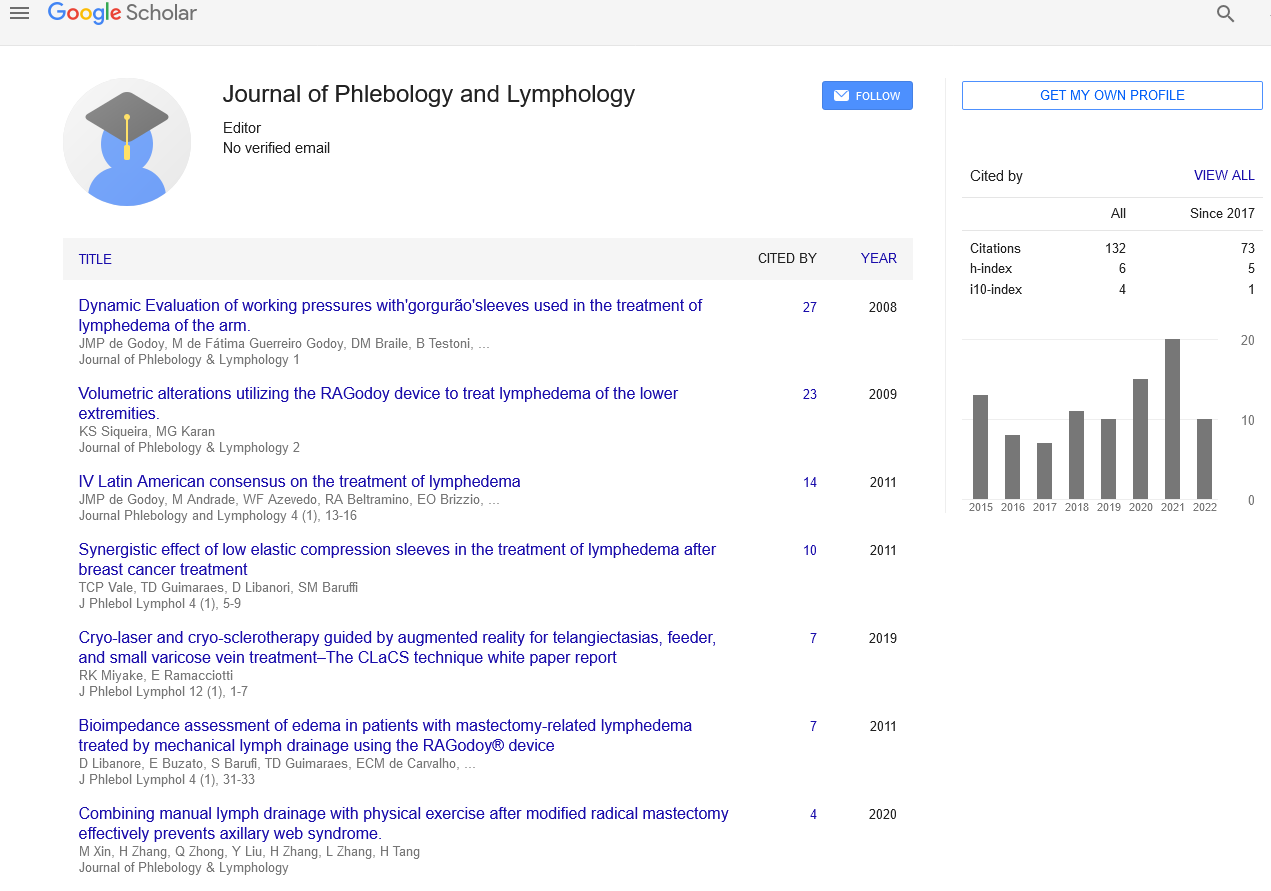Unraveling the complexities of lymphology: understanding the crucial role of the lymphatic system
Received: 10-Jan-2023, Manuscript No. puljpl-23-6478; Editor assigned: 12-Jan-2023, Pre QC No. puljpl-23-6478 (PQ); Accepted Date: Jan 26, 2023; Reviewed: 22-Jan-2023 QC No. puljpl-23-6478 (Q); Revised: 25-Jan-2023, Manuscript No. puljpl-23-6478 (R); Published: 28-Jan-2023, DOI: 10.3752/puljmbr.2023.16(1).01-02
Citation: Chiaramonte E. Unraveling the complexities of lymphology: Understanding the crucial role of the lymphatic system. J Phlebol Lymphology. 2023; 16(1):1-2.
This open-access article is distributed under the terms of the Creative Commons Attribution Non-Commercial License (CC BY-NC) (http://creativecommons.org/licenses/by-nc/4.0/), which permits reuse, distribution and reproduction of the article, provided that the original work is properly cited and the reuse is restricted to noncommercial purposes. For commercial reuse, contact reprints@pulsus.com
Abstract
The intricate network of veins, nodes, and organs known as the lymphatic system is essential to the body's general health and wellbeing. The lymphatic system, which is frequently overshadowed by its more The intricate network of veins, nodes, and organs known as the lymphatic system is essential to the body's general health and wellbeing. The lymphatic system, which is frequently overshadowed by its more well-known counterpart, the circulatory system, is an integral aspect of our immune system and makes it possible for fluids, nutrients, and waste materials to be transported throughout the body. As scientists learn more about the activities of this complex system, known as lymphology, they are beginning to consider the consequences for human health.
Key Words
Lymphatic vessels, Lymphocytes, Lymphatic circulation
Introduction
The lymphatic system, a complex network of vessels, nodes, and organs, plays a crucial role in maintaining the body's overall health and well-being. Often overshadowed by its more renowned counterpart, the circulatory system, the lymphatic system serves as an essential component of our immune system and facilitates the transportation of fluids, nutrients, and waste products throughout the body. This intricate system, known as lymphology, has garnered increasing attention in recent years, as researchers delve deeper into its functions and implications for human health.
The lymphatic system consists of an elaborate network of lymphatic vessels that permeate nearly every organ and tissue within the body. These vessels are responsible for collecting excess fluid, known as lymph, from the interstitial spaces between cells and returning it to the bloodstream. Lymph is composed of water, proteins, fats, immune cells, and cellular debris, all of which play vital roles in maintaining tissue health and combating infections.
At regular intervals along the lymphatic vessels, small beanshaped structures called lymph nodes can be found. These nodes act as filtration centers, where immune cells known as lymphocytes monitor and fight off pathogens present in the lymph. Lymph nodes also play a vital role in the immune response by facilitating the production of antibodies and generating an adaptive immune response. unidirectional flow of lymph, preventing any backward movement. Lymphatic vessels gradually merge to form larger vessels, resembling the branches of a tree, ultimately leading to the formation of two main lymphatic ducts. One of the primary functions of the lymphatic system is to maintain fluid balance within the body. It collects excess fluid and proteins from the tissues and returns them to the bloodstream, preventing the accumulation of fluid and maintaining tissue health.
The lymphatic system is an integral part of our immune response. Lymph nodes, scattered throughout the body, act as checkpoints for pathogens. They filter lymph, trapping and eliminating foreign particles and facilitating the activation of immune cells.
In the gastrointestinal system, specialized lymphatic vessels called lacteals assist in the absorption of dietary fats and fat-soluble vitamins. These vessels transport the absorbed fats, packaged as chylomicrons, to the bloodstream. Research in lymphology has shed light on the critical role of the lymphatic system in various health conditions and diseases. Disorders of the lymphatic system can lead to lymphedema, a condition characterized by the abnormal accumulation of fluid and swelling in the affected area. This condition can arise due to genetic abnormalities, trauma, infection, or surgery. Understanding the underlying mechanisms of lymphedema and developing effective treatments has been a focus of lymphology research. Moreover, the lymphatic system plays a pivotal role in the spread of cancer cells. Metastasis, the process by which cancer cells break away from the primary tumor and travel to distant sites, often occurs through the lymphatic vessels. Research in lymphology has helped elucidate the factors influencing tumor cell migration, paving the way for targeted therapies and novel treatment strategies. Over the years, advancements in imaging technologies, such as lymphoscintigraphy and lymphangiography, have enabled researchers to visualize and study the lymphatic system more comprehensively. These techniques provide valuable insights into the structure and function of the lymphatic vessels, aiding in the diagnosis and management of lymphatic disorders.
Furthermore, the development of lymphatic-specific markers and animal models has facilitated the study of lymphatic development, regeneration, and disease progression. Researchers are now able to investigate genetic and molecular mechanisms underlying lymphatic disorders and explore potential therapeutic interventions.
Conclusion
Lymphology, the study of the lymphatic system, continues to uncover the intricate functions and significance of this oftenoverlooked system. As our understanding of lymphology deepens, so does our ability to diagnose, treat, and prevent various diseases associated with the lymphatic system. Ongoing research in this field holds tremendous potential to unlock new therapeutic targets and approaches, enhancing our overall knowledge of human health and well-being.





